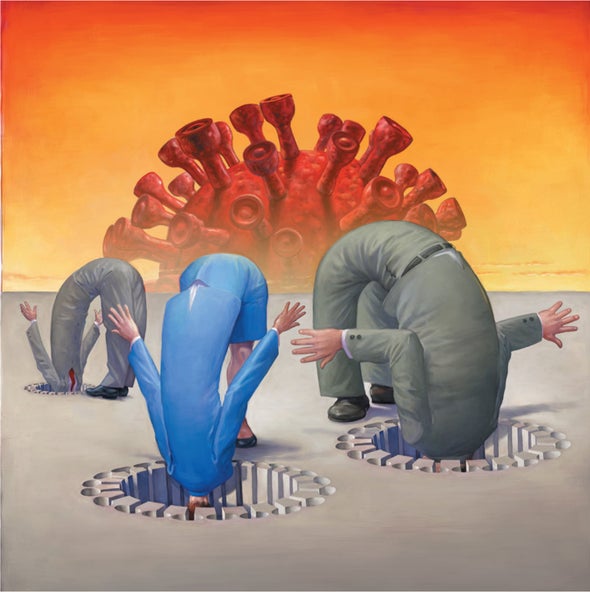This morning I had a surprisingly lengthy discussion with my wife about whether it was Wednesday or Thursday. I'm writing this in early April from New York City, currently the global epicenter of the COVID-19 outbreak. We've already been mostly indoors for weeks, and the days have a sameness that brings to mind the movie Groundhog Day, but with body counts.
As this is allegedly a humor column, I'll look for some humor in this horror. Thankfully, there's the earnest Australian astrophysicist who meant well when he started shoving mini but relatively mighty magnets up his nose.
According to the British newspaper the Guardian, 27-year-old Daniel Reardon was trying to “invent a device that stops people touching their faces during the coronavirus outbreak.” Reardon's usual focus is on using data from pulsar timing arrays to search for nanohertz-frequency gravitational waves, so magnets are a bit out of his bailiwick.
The idea, we'll call it, was for a user to wear magnets on his or her wrists and also somewhere near the face. Some circuitry would initiate a buzzing sound when the magnets got close together. The buzz would remind wearers not to mug their mugs. But the best-laid plans of aardvarks and astrophysicists oft go agley.
Failing and then flailing, a bored Reardon put a magnet in his nostril. Thus it began. He ended up with four magnets jammed in his breathing holes, each strongly attracting the others. An attempt to pull the magnets out with pliers also went agley when the tool itself became magnetized, leading to some spooky nose action at a rather small distance—think of a diminutive metal wand with a sole magic power: the ability to move your nose around from an inch away. Reardon wound up at a hospital, thus burdening the very health care system he meant to relieve.
We now go from shoving things up one's nose to pulling things out of one's derriere. In early April, Georgia governor Brian Kemp and New York mayor Bill de Blasio said we had just learned asymptomatic people could spread the virus. Yeah, no.
In an article posted on February 28 on the New England Journal of Medicine's Web site, Bill Gates wrote that there was “strong evidence that [the virus] can be transmitted by people who are just mildly ill or even presymptomatic.” The scientific citation for that claim was a letter published at NEJM.org on February 18.
Of course, Gates is not a medical researcher. But he is very, very rich. Which you'd think would be sufficient to gain the trust of politicians. Take Donald Trump. (Yeah, yeah.) The president was presumably born with some potential for competence, eventually achieved incompetence, and now we have had that incompetence thrust upon us. On March 27 he said of the coronavirus causing COVID-19, “You can call it a germ. You can call it a flu. You can call it a virus. You know, you can call it many different names. I'm not sure anybody even knows what it is.”
In response to that sterling example of nihilistic blather (our sister journal Nature published genome-sequence info on February 3 about what was clearly a virus), I'll go to Laurie Garrett, author of the 1994 pandemic bible The Coming Plague and still on the beat. On April 1 she was on a Sustain What? Webcast, part of a series launched in March by Andrew Revkin, the longtime journalist now running a communication and sustainability initiative at Columbia University's Earth Institute. Garrett recounted leaving her Manhattan apartment recently to buy milk:
The streets were full of people. And they were all young people who'd somehow gotten the message that this is only dangerous for old people … and a lot of politicians are the major vehicles of this misinformation … and if [young people] get infected it's no biggie. Well, it is a biggie! Because you can infect others. You can pass your virus on. You perpetuate the epidemic. And, yes, you can get sick … and so the consequences of any statement by any leader that isn't rooted in solid science … is socially irresponsible, is costing lives, is actually killing people.
After a tour of the Centers for Disease Control and Prevention (in the capital of Kemp's state) on March 6, Trump bragged about how well he understands medical science. “Maybe I have a natural ability,” he said. “Maybe I should have done that instead of running for president.” A risk-analysis comparison leads me to think Hippocrates would have approved.

